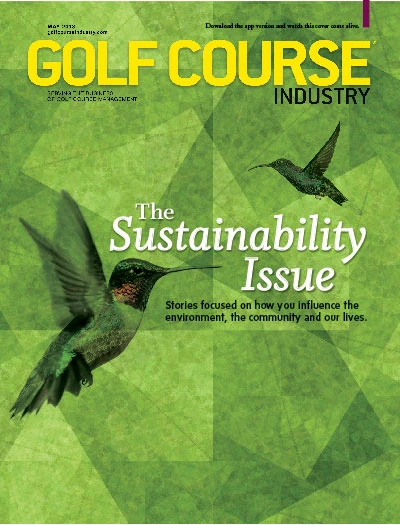 John Kaminski John Kaminski |
Remember when we used to talk about “IPM” programs? Integrated Pest Management was the standard phrase for all of the care and attention towards the environment when it came to managing golf courses. The new buzzword? Sustainability. The word gets dropped by many superintendents and companies trying to market their products for use in our industry. While I’m a huge fan of the idea of sustainability, I am often confused by exactly what is meant by the term. I have asked many people to define sustainability, only to receive various definitions… in addition to a few blank stares. Andrea Li, assistant golf superintendent at Connaught Golf Club in Canada, said sustainability is designed “to preserve the longevity of the golf course environment for our future generations of golfers.” Via Twitter, @Aquatrols relayed the International Golf Federation’s definition of sustainability as “Optimizing the playing quality of the golf course in harmony with the conservation of its natural environment under economically sound and socially responsible management.” In my opinion, sustainability is no different than IPM. In integrated pest management we utilize all resources available to us to provide a product. We take into account the economy as well as the environment. Isn’t this similar to maintaining a course in a sustainable way? As I see it, the problem doesn’t lie in the definition of the word, but rather the varying opinions of what it means to the individual. I’m guessing if you ask a superintendent and an anti-golf environmentalist what it means, you’ll get two very different answers. In other words, there are varying degrees to which people will consider themselves to be managing turfgrass in a sustainable manner. Due to these differences, the debate over what is sustainable can get heated. The idea of sustainability is one that many people are passionate about and for that reason “push” their ideas on others. It’s like an argument about religion or politics. The problem is there is no right answer. Different people are going to have varying ideas and beliefs on whether they are sustainable in their management practices. Let me use the vegetarian example. For about two years in college I decided to become a vegetarian. During this period I gave up all meat except for fish. People were always curious about my decision and it invoked a lot of discussion. My meat-eating friends would make fun of my food choices, while others would say I wasn’t “really a vegetarian” because I ate fish. The best discussion involved a vegan who told me and a “true vegetarian” that neither of us were doing it right. I didn’t know there was a wrong way. The bottom line is everyone has different degrees to which they consider themselves sustainable, but most if not all of us practice some level of sustainability in our management practices. So why do people push their practices on others when most can’t even agree on a definition? In some cases it’s a superintendent’s philosophy and passion. I see this often with greenkeepers in the UK. They are passionate about their sustainable management practices, but in many cases I can’t really see what they’re doing differently from U.S. superintendents. Yes, they may use fewer pesticides (due primarily to weather-related circumstances) than a mid-Atlantic superintendent, but many of them still use pesticides to some degree. So do uncontrollable climatic differences make one turfgrass manager more sustainable than another? If we accept that varying climatic conditions define sustainability, then we should probably shut down every desert course. Surely, the use of irrigation for the game of golf can’t be considered sustainable can it? The answer is there are costs and benefits for everything. If we were truly sustainable we would all walk to work, grow our own food, and consume only what was necessary. We surely wouldn’t drive our gas-guzzling trucks, eat store-bought food, or indulge in anything considered unnecessary to sustain our lives. Although it may seem like I’m anti-sustainability, the exact opposite is true. I feel we all can improve our management practices through proper IPM strategies. However, we should stop worrying about why others don’t do it like us and focus on what we as individuals can do in our specific cases. What is considered sustainable at a Minnesota muni course is not going to be the same at a West Chester, N.Y. private club. Superintendents should work together to share programs and discuss what really works. If so, then the industry will continue to improve. We must stop placing one definition on sustainable turfgrass management.
As always, John encourages reader comments. Share your stories with him on Twitter (@johnkaminski). |

Explore the May 2013 Issue
Check out more from this issue and find your next story to read.
Latest from Golf Course Industry
- From the publisher’s pen: Conscientious of a bigger role
- Bernhard and Company partners with Laguna Golf Phuket
- Terre Blanche showcases environmental stewardship
- VIDEO: Introducing our December issue
- Bernhard and Company introduces Soil Scout
- Nu-Pipe donates to GCSAA Foundation’s Centennial Campaign
- GCSAA enhances golf course BMP tool
- Melrose leadership programs sending 18 to 2026 GCSAA Conference and Trade Show





